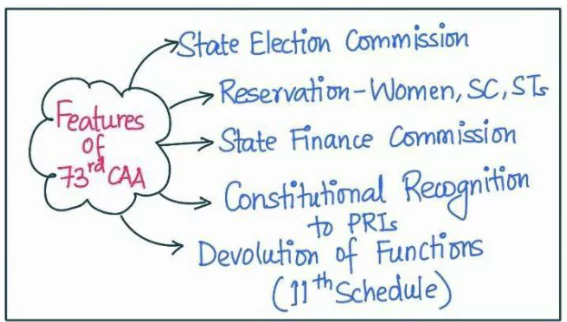Answer:
|
How to approach the question
- Introduction:
- Write about the 73rd amendment act.
- Body
- Highlight the impact of the 73rd amendment act on grassroot institutions.
- Write about the challenges being faced by PRI in their effective functioning.
- Conclusion
- Conclude by suggesting way forward.
|
Introduction
The 73rd Amendment Act established the third tier of governance and provided constitutional recognition to Panchayati Raj Institutions (PRIs). This amendment aligns with Mahatma Gandhi’s vision of Gram Swaraj and aims to transform representative democracy into grassroots participatory democracy, where communities actively contribute to governance and decision-making processes.
Following are the transformative impact of the 73rd Amendment Act at grassroots institutions:
- Representative Democracy: The amendment mandates direct elections for people’s representatives in PRIs, ensuring that they are chosen by the local population.
 Women Leadership: One-third reservation for women in both membership and leadership roles within PRIs promotes gender equality and empowers women in local governance. Some states like Maharashtra have increased this to 50%.
Women Leadership: One-third reservation for women in both membership and leadership roles within PRIs promotes gender equality and empowers women in local governance. Some states like Maharashtra have increased this to 50%.- Inclusivity: The participation of Scheduled Castes, Scheduled Tribes, and Backward Classes has increased fostering inclusivity and addressing historical disadvantages.
- Rural Development: By devolving 29 subjects to PRI the amendment recognizes the importance of people’s participation in the rural development process.
- Accountability and Transparency: in local governance through regular interactions in Gram Sabhas, social audit, promoting public scrutiny and efficient resource utilization.
- Grassroots Participation: This allows Gram Sabhas to decide on the types of work to be undertaken in their villages and utilize allocated funds accordingly.
- Political Awareness: Increased political awareness and sense of responsibility among citizens have led to a decrease in exploitation.
- Discarded Social Institutions: The importance of archaic social institutions like Caste Panchayats has diminished, reducing their influence on political power.
- De-bureaucratization: The influence of bureaucracy in local governance has decreased, allowing for more citizen-driven decision-making.
However, despite these achievements, PRIs face certain challenges in their effective functioning:
- Lack of Dedicated Functionaries: PRIs often lack full-time dedicated functionaries to carry out their assigned functions.
- Limited Functions: Some states are hesitant to devolve more functions to PRIs, limiting their scope and potential for effective local governance.
- Insufficient Funds: Dependency on state funding for implementing rural development projects hampers the independent functioning of PRIs as the third tier of government.
- Political interference: PRIs encounter challenges due to political interference, impacting their autonomy and decision-making processes.
- Social and cultural barriers: Deep-rooted social and cultural barriers, such as caste discrimination and gender biases, hinder the effective functioning of PRIs and limit the participation of marginalized sections of society.
Suggestions for Improvement:
- Establish a separate cadre and provide training for dedicated functionaries in PRIs.
- Encourage states to devolve more functions to PRIs to enhance their effectiveness.
- Ensure adequate financial resources for PRIs through diverse revenue sources and grants.
- Promote financial autonomy by allowing PRIs to borrow from banks and financial institutions.
The 73rd Amendment Act has institutionalized participatory democracy. To further strengthen this system and ensure a genuine transition from representative democracy to participatory democracy, there is a need for increased public awareness and measures to address the challenges faced by PRIs, such as the provision of dedicated functionaries, devolution of more functions, and adequate financial resources.
To get PDF version, Please click on "Print PDF" button.
 Women Leadership: One-third reservation for women in both membership and leadership roles within PRIs promotes gender equality and empowers women in local governance. Some states like Maharashtra have increased this to 50%.
Women Leadership: One-third reservation for women in both membership and leadership roles within PRIs promotes gender equality and empowers women in local governance. Some states like Maharashtra have increased this to 50%.

Latest Comments